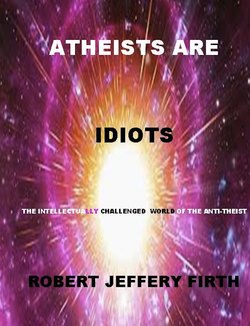Atheists Are Idiots

Реклама. ООО «ЛитРес», ИНН: 7719571260.
Оглавление
Robert Boone's Firth. Atheists Are Idiots
CHAPTER 1. What the hell is an atheist
CHAPTER 2. The philosophy of anti-theism
CHAPTER 3. Demographics of atheism
CHAPTER 4. Discrimination against atheists
CHAPTER 5. Secularization
CHAPTER 6. The Rationalist Theory
CHAPTER 7. Phenomenology of Religion
CHAPTER 8. Confessions of a Lonely Atheist
CHAPTER 9. The Test
CHAPTER 10. The Atheist is Truly Blind
CHAPTER 11. Einstein and Science on Religion
CHAPTER 12. How We Know God Exists
CLOSING THOUGHTS
APPENDICES
Отрывок из книги
Antitheism (sometimes anti-theism) implies an opposition to theism. The etymological roots of the word lie in the Greek anti-and theismos. The term has had a range of applications; in secular contexts, it typically refers to a direct opposition to organized religion or, to the belief in any deity. While in a theistic context, it sometimes refers to opposition of a specific god or gods. The anti-theist is defined by the Oxford English Dictionary as "One opposed to belief in the existence of a god." The earliest citation given for this meaning is from 1833. An antitheist may be opposed to belief in the existence of any god or gods, not merely one in particular.
This book is not necessarily written to convert anyone to a recognition or belief in our creator but, if such were to be the case, that’s all to the good. Rather, the book is meant to provide the reader with some logical and thoughtful reasoning concerning those who do believe in a creator and those who proclaim that such does not exist. We don’t wish to “sell” anyone on anything, especially, any particular belief system, The purpose is to acquaint the reader with the rich heritage of theistic and anti-theistic thought that many of us, both those living and those not, have had to say on the subject.
.....
This view has been criticized by philosophers such as Sir Karl Popper, (1902 –1994) an Austro-British philosopher and professor at the London School of Economics who is regarded as one of the greatest philosophers of science of the 20th century. Karl thought falsifying criterion should be used to test true statements rather than relying on verifiability criterion alone. Karl obviously needed a few aspirin after trying to think this through! “There is no meaning to why we are here.” Of course, who else could say this but Friedrich Nietzsche? His view that nihilism voids human existence of having meaning. Nihilism is named for the word ‘nihil,’ which is Latin for ‘nothing.’ Nietzsche considered Christianity’s concern with the afterlife stronger than its occupation with life on Earth, so (ergo) he considered the meaning of life empty.
The French philosopher and scientist, Rene Descartes, asserted that life itself may not even be real, but rather might only be a dream. (Good grief, wake me up when it’s over!) Rene questions even the reality of our physical bodies. I didn’t know that they played with peyote back then. Some less imaginative people hold the view that the true meaning of why humankind is here is the result of either accident or coincidence. Descartes came up with an eloquent semantic proof (a syllogism, if you will) for proof of the existence of himself and therefore God. He simply said, “Cogito ergo sum.” Meaning, I am, therefore, he must be!
.....